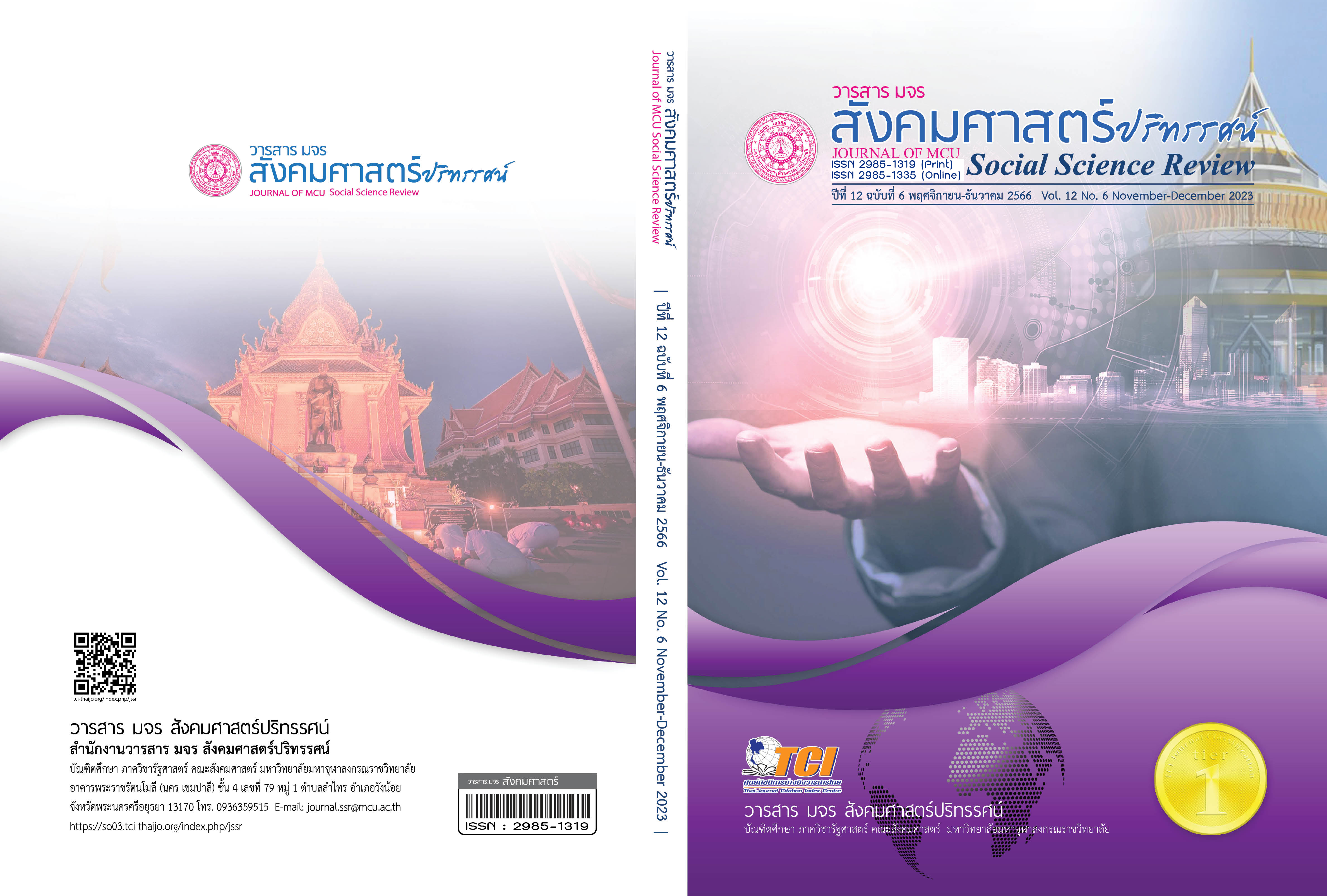การพัฒนาโปรแกรมเสริมสร้างภาวะผู้นำดิจิทัลของครู สังกัดสำนักงานเขตพื้นที่การศึกษามัธยมศึกษานครราชสีมา
คำสำคัญ:
การพัฒนาโปรแกรม, ภาวะผู้นำดิจิทัล, ภาวะผู้นำดิจิทัลของครูบทคัดย่อ
บทความวิจัยนี้มีวัตถุประสงค์ 1. เพื่อศึกษาสภาพปัจจุบัน สภาพที่พึงประสงค์ และความต้องการจำเป็นในการเสริมสร้างภาวะผู้นำดิจิทัลของครู สังกัดสำนักงานเขตพื้นที่การศึกษามัธยมศึกษานครราชสีมา กลุ่มตัวอย่าง ได้แก่ ครู จำนวน 346 คน และผู้ทรงคุณวุฒิ จำนวน 9 คน 2. เพื่อพัฒนาโปรแกรมเสริมสร้างภาวะผู้นำดิจิทัลของครู สังกัดสำนักงานเขตพื้นที่การศึกษามัธยมศึกษานครราชสีมา กลุ่มผู้ให้ข้อมูล ได้แก่ ครู จำนวน 6 คน และผู้ทรงคุณวุฒิ จำนวน 7 คน เลือกแบบเจาะจง เครื่องมือที่ใช้ในวิจัย คือ แบบสอบถามสภาพปัจจุบัน สภาพที่พึงประสงค์ แบบสัมภาษณ์ แบบบันทึกการสนทนากลุ่ม แบบบันทึกการการสัมมนาอิงผู้เชี่ยวชาญ และแบบสอบถามประเมินโปรแกรม สถิติที่ใช้ในการวิจัย ได้แก่ การแจกแจงความถี่ ร้อยละ ค่าเฉลี่ย ส่วนเบี่ยงเบนมาตรฐาน และวิเคราะห์ลำดับความสำคัญของความต้องการจำเป็นด้วยค่าดัชนี PNI Modified
ผลการวิจัยพบว่า 1. สภาพปัจจุบันของภาวะผู้นำดิจิทัลของครู อยู่ในระดับมาก สภาพที่พึงประสงค์ของภาวะผู้นำดิจิทัลของครู อยู่ในระดับ มากที่สุด 2. โปรแกรมเสริมสร้างภาวะผู้นำดิจิทัลของครู ประกอบด้วย 1) หลักการ 2) วัตถุประสงค์ 3) เนื้อหา มี 4 Module คือ การบริหารทรัพยากรดิจิทัล การสอนบูรณาการดิจิทัล การประยุกต์ใช้ดิจิทัล และ การสื่อสารดิจิทัล ผลการประเมินโปรแกรมเสริมสร้างภาวะผู้นำดิจิทัลของครู 4) วิธีการพัฒนา และ 5) การประเมินผลการพัฒนา พบว่า มีความเหมาะสม และความเป็นไปได้โดยรวมอยู่ในระดับมาก
เอกสารอ้างอิง
จิณณวัตร ปะโคทัง. (2561). ภาวะผู้นำยุคดิจิทัลสำหรับผู้บริหารสถานศึกษามืออาชีพ. อุบลราชธานี: ศิริธรรมออฟเซ็ท.
เฉลิมพล สุปัญญาบุตร. (2561). การพัฒนาโปรแกรมเสริมสร้างสมรรถนะครูด้านการจัดการเรียนรู้เชิงรุก สังกัดสำนักงานเขตพื้นที่การศึกษามัธยมศึกษาเขต 24 (วิทยานิพนธ์การศึกษามหาบัณฑิต สาขาวิชาการบริหารและพัฒนาการศึกษา). มหาสารคาม: มหาวิทยาลัยมหาสารคาม.
ทวี จันทร์เติม. (2561). การพัฒนาโปรแกรมพัฒนาครูในการใช้นวัตกรรมและเทคโนโลยีเพื่อการจัดการเรียนรู้ ของสถานศึกษาสังกัดองค์กรปกครองส่วนท้องถิ่น (วิทยานิพนธ์การศึกษามหาบัณฑิต สาขาวิชาการบริหารและพัฒนาการศึกษา). มหาสารคาม: มหาวิทยาลัยมหาสารคาม.
เทวฤทธิ์ ผลจันทร์. (2564). โปรแกรมเสริมสร้างภาวะผู้นำทางวิชาการของครู สังกัดสำนักงานเขตพื้นที่การศึกษามัธยมศึกษา เขต 27 (วิทยานิพนธ์การศึกษามหาบัณฑิต สาขาวิชาการบริหารและพัฒนาการศึกษา). มหาสารคาม: มหาวิทยาลัมหาสารคาม.
ธำรง บัวศรี. (2542). ทฤษฎีหลักสูตร การออกแบบ และการพัฒนา. กรุงเทพฯ: ธนธัชการพิมพ์.
นันทรัตน์ ฤทธิ์บำรุง. (2559). การพัฒนาโปรแกรมเสริมสร้างภาวะผู้นำครูด้านการเป็นแบบอย่างทางการสอนสำหรับสถานศึกษา สังกัดสำนักงานเขตพื้นที่การศึกษามัธยมศึกษา เขต 30 (วิทยานิพนธ์การศึกษามหาบัณฑิต สาขาวิชาการบริหารและพัฒนาการศึกษา). มหาสารคาม: มหาวิทยาลัมหาสารคาม.
นิตยา วงศ์ใหญ่. (2560). แนวทางการพัฒนาทักษะการรู้ดิจิทัลของดิจิทัลเนทีฟ. วารสารวิชาการ Veridian E-Journal, 10(2), 1630-1642.
บุญชม ศรีสะอาด. (2553). การวิจัยเบื้องต้น (พิมพ์ครั้งที่ 8). กรุงเทพฯ: สุวีริยาสาส์น.
พฤทธิ์ ศิริบรรณพิทักษ์. (2561). การพัฒนากลไกลขับเคลื่อนระบบการผลิตและพัฒนาครู สมรรถนะสูงสำหรับประเทศไทย 4.0. กรุงเทพฯ: สำนักงานเลขาธิการสภาการศึกษา.
พัชราภรณ์ ดวงชื่น. (2561). ผู้นำองค์กรในโลก VUCA. วารสารมหาวิทยาลัยคริสเตีย, 24(3), 450-458.
เยาวลักษณ์ จิตต์วโรดม. (2560). บทบาทและทักษะหลักของภาวะผู้นำในสังคมยุคดิจิทัล Role and Key Skills of Digital Society Leadership. วารสารธุรกิจปริทัศน์, 9(2), 81-91.
สุกัญญา แช่มช้อย. (2561). การบริหารสถานศึกษาในยุคดิจิทัล = School Management in Digital. กรุงเทพฯ: จุฬาลงกรณ์มหาวิทยาลัย.
สุมิตรา พงศธร. (2550). สรุปเรื่องของหลักสูตร. วารสารสภาการศึกษาคาทอลิกแห่งประเทศไทย, 7(9), 15–23.
สำนักงานเลขาธิการสภาการศึกษา. (2562). ยุทธศาสตร์ชาติด้านการพัฒนาและเสริมสร้างศักยภาพทรัพยากรมนุษย์. กรุงเทพฯ: สำนักงานคณะกรรมการการศึกษาขั้นพื้นฐาน.
สำนักงานคณะกรรมการการศึกษาขั้นพื้นฐาน. (2562). พระราชบัญญัติการศึกษาแห่งชาติ พ.ศ. 2542 แก้ไขเพิ่มเติม (ฉบับที่ 4). กรุงเทพฯ: สำนักงานคณะกรรมการการศึกษาขั้นพื้นฐาน.
สำนักงานส่งเสริมเศรษฐกิจดิจิทัล. (2560). แผนการส่งเสริมเศรษฐกิจดิจิทัล พ.ศ. 2561-2564. กรุงเทพฯ: กระทรวงดิจิทัลเพื่อเศรษฐกิจและสังคม.
สำนักงานคณะกรรมการข้าราชการครูและบุคลากรทางการศึกษา. (2563). กรอบแนวทางการพัฒนาทักษะด้านดิจิทัลสำหรับข้าราชการครูและบุคลากรทางการศึกษา. สืบค้น 21 ตุลาคม 2565, จาก https://otepc.go.th/th/content_page/item/2928-4
Barr, D., et al. (2011). Computational Thinking: A Digital Age Skill For Everyone. Learning and Leading with Technology, 38(6), 20–23.
Boone, E.J. (1992). Developing Programs in Adult Education. Illinois: Waveland Press, Inc.
Caffarella, R. (2002). Planning Programs for Adult Learners. (2nd ed). San Francisco, CA: Jossey-Bass.
Kaganer, E., et al. (2014). The 5 keys to a Digital Mindset. Retrieved March 3, 2021, from http://www.forbes.com/sites/iese/2014/03/11/the-5-keys
Morgan, D.L. (1997). Focus Groups as Qualitative Research. Sage Publications, Thousand Oaks.
ดาวน์โหลด
เผยแพร่แล้ว
รูปแบบการอ้างอิง
ฉบับ
ประเภทบทความ
สัญญาอนุญาต
ลิขสิทธิ์ (c) 2023 วารสาร มจร สังคมศาสตร์ปริทรรศน์

อนุญาตภายใต้เงื่อนไข Creative Commons Attribution-NonCommercial-NoDerivatives 4.0 International License.
เพื่อให้เป็นไปตามกฎหมายลิขสิทธิ์ ผู้นิพนธ์ทุกท่านต้องลงลายมือชื่อในแบบฟอร์มใบมอบลิขสิทธิ์บทความให้แก่วารสารฯ พร้อมกับบทความต้นฉบับที่ได้แก้ไขครั้งสุดท้าย นอกจากนี้ ผู้นิพนธ์ทุกท่านต้องยืนยันว่าบทความต้นฉบับที่ส่งมาตีพิมพ์นั้น ได้ส่งมาตีพิมพ์เฉพาะในวารสาร มจร สังคมศาสตร์ปริทรรศน์ เพียงแห่งเดียวเท่านั้น หากมีการใช้ภาพหรือตารางหรือเนื้อหาอื่นๆ ของผู้นิพนธ์อื่นที่ปรากฏในสิ่งตีพิมพ์อื่นมาแล้ว ผู้นิพนธ์ต้องขออนุญาตเจ้าของลิขสิทธิ์ก่อน พร้อมทั้งแสดงหนังสือที่ได้รับการยินยอมต่อบรรณาธิการ ก่อนที่บทความจะได้รับการตีพิมพ์ หากไม่เป็นไปตามข้อกำหนดเบื้องต้น ทางวารสารจะถอดบทความของท่านออกโดยไม่มีข้อยกเว้นใดๆ ทั้งสิ้น





